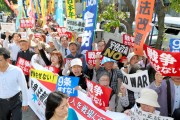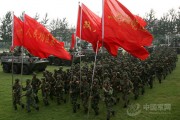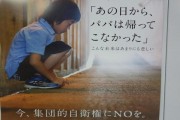Tokyo University hit the headlines this week after media outlets reported that the University was to lift its long ban on military research.
Shortly after this article was published, Principal Hamada Jun’ichi came forward to say that the university would not be lifting its ban on military research and that the media had reported this in error.
The university did, however, revise its guidelines on military research, which has led some critics to point out that a lift on the ban might still be in the pipeline.
Still, when the news first broke there were two clear camps of opinion among netizens; those who thought it was a positive move that would benefit Japan, and those who that it was simply a step toward Japan’s involvement in war.
What do you think? Should Japan’s most prestigious public university lift its ban on military research?
From Yahoo! Japan:
Tokyo University Lifts Ban On Military Research, Will Put Some Limits On Public Premise
It has been understood that on January 15, Tokyo University (Principal Hamada Junichi) had lifted a ban on military research at the university, which had previously been forbidden. This was clarified by a Tokyo University spokesperson. In-keeping with the Abe Administration approval of national security strategy that aims at effective use of military research at universities, Tokyo University, which receives a subsidy from the government in the field of 80 billion yen [approx. $85 million] each year, changed its policy. It appears that this reversal will have an influence on the management policies of other universities in which military research is banned.
Tokyo University affirmed its policy that “it would not carry out research that might be suspected of being military research, let alone military research itself” at meetings of its executive board in 1959 and 1967, and banned military research in every faculty. Moreover, in 1969, the university and its staff union agreed to ban military research and any aid from the military, thereby continuing to avoid involvement with the military.
However, in December last year, the guidelines at the Graduate School of Information Science and Technology were revised, with the school explaining that “We go forward with our research profoundly conscious of the ambiguity between military use and use for peace”. They approved research into dual-use technologies (used for both military and civil purposes). They did however put a limit on the research, saying “We will not carry out military research that is top secret and whose results will not be made public”. Previously, the University had said “Military research is forbidden without the slightest exception”.
According to Tokyo University, the executive committee is the University’s deliberative council, and the decision making power regarding management policies, such as the pros and cons of military research, lies with the principal. The principal has no legal obligation to follow the results of the deliberative council. Despite this, the principle of banning military research had been based on remarks relating to avoiding military research by the principals and other members during meetings of the executive board.
Regarding the reason for lifting the ban, Tokyo University emphasized that “Dual-use research is being carried out at the universities of a number of countries. The guidelines were revised in accordance with international trends that ensure that the results of the research are publicly available”.
On the matter of military research at the University, in April last year it was revealed that a number of professors had been receiving cash under the pretense of research expenses from an organization under the umbrella of the US military since 2004, causing a revolt among those researchers who had been fettered by the school’s own rules. In May, the Ministry of Defense called for graduate school professors to co-operate in a survey as part of the investigations into a Japan Air Self Defense Force transportation aircraft which had defects, but this was declined.
Comments from Yahoo! Japan:
hil*****:
I’ve heard that even plastic wrap was developed for military purposes, so there are things like that as well. How would they deal with that?
typ*****:
Isn’t this going to be good for Japan???
I suppose that some things that were made for military purposes can also be used for other things, too.
enn*****:
A pencil, a cutter, these are all linked to the military.
Is there any technology that is unrelated to the military?
BOZ*****:
You could use almost anything for military purposes if you put your mind to it.
I don’t really get what the criteria are….
asu*****:
I think we should learn about things related to the military.
With things as they are in the world right now, the military is inseparable from that.
enn*****:
“Advancement of technology goes hand in hand with military advancements”.
There was a time when that was said, and back then Tokyo University was behind the rest of the world in engineering because they’d banned military research. That’s probably had an influence on why we have so few Nobel Prizes related to engineering.
jui*****:
It seems that even the Internet was originally developed to be used by the military. What’s the problem?
mar*****:
It links to our national interests and in light of the times we live in, I really want them to do their best with this research.
Comments from Twitter:
90years현일:
Looks like they’re steadily going ahead with this bit by bit.
Tama Tanaka:
Tokyo University is going to partially lift its ban on military research #theworldisheadingforwar.
小沢一郎勝手連:
So Tokyo University is going to lift the ban on military research.
Really awful.
Nobi Wang:
I wonder how they’re going to distinguish what’s for a military purpose?
杉浦 幹:
They’re lifting the ban on military research.
Do you hear that!? The sound of army boots!
ぞむ、のまど(非公式/非公認/非売品):
“We’re not saying that we’re going to go to war” And so the military research has begun.
岩 大海:
Before that they’ll get radioactive contamination! It’s best to give up on going to Tokyo University. If you think it’s distinguished! A kid would understand that…@abe_owari: Now Tokyo University students are also soldiers. If you go to Tokyo University, you’ll be one of the war dead.
mjy:
Defending a country doesn’t have to be about the military. For example, energy reserve technology contributes to national defense, but it’s not a military technology. The Internet has been researched as part of the US Department of Defense, but it’s not military research. Up to now, actually it’s been part of Japan’s national defense to not carry out military research.









